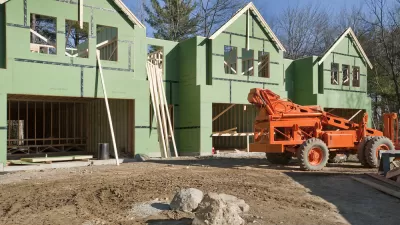How exactly does RAD work and why is there a raging debate over whether it’s putting tenants’ rights and housing affordability in peril?

Last fall, Shelterforce published an article about a new HUD initiative called the Faircloth-to-RAD program, which could help public housing authorities rebuild upward of 227,000 units of "public housing." Public housing gets the scare quotes treatment here because calling it that garnered pushback from some Shelterforce readers who argue the new initiative might build housing, but not public housing.
HUD is using an existing program called Rental Assistance Demonstration (RAD) to help fund the construction of those 227,000 units. RAD allows public housing authorities to switch from using public housing program subsidies, which Congress has largely underfunded, to project-based Section 8 subsidies, which Congress has funded (comparatively) well. Public housing authorities can use the guarantee of Section 8 funding to pull together other loans, tax credits, and grants to rehab or build new housing. Housing authorities can also use RAD to outsource ownership and management of the units to nonprofit or even for-profit entities.
While it’s true that some units built under the program will not be managed by public housing authorities, HUD considers the housing built through Faircloth-to-RAD public housing. Even though those new units will be funded by Section 8 vouchers, the units will count toward the public housing program’s 1999 unit cap.
Therein lies the debate: is RAD a privatization program? What constitutes privatization? Are units built through Faircloth-to-RAD really public housing? Some of the pushback to the article last fall stems from the very real problems created by past public housing redevelopment programs, like HOPE VI, which resulted in significant displacement of public housing tenants, degradation of tenants’ rights, and the loss of more than 43,000 units of public housing that weren’t replaced after demolition. Advocates fear RAD could result in the loss of rights for tenants in the short term and a loss of deeply affordable housing in the long term.
But some of the pushback stems from a misunderstanding of how RAD works. Contrary to common wisdom, RAD does not require public housing authorities to transfer ownership or management to nonprofit or for-profit entities, and fewer than half of RAD-converted units have changed hands so far.
Shelterforce spoke with housing advocates, researchers, tenant organizers, and HUD officials to help clarify how RAD works and why the debate over whether it’s putting tenants’ rights and housing affordability in peril continues to rage.
FULL STORY: Does RAD Privatize Public Housing?

Planetizen Federal Action Tracker
A weekly monitor of how Trump’s orders and actions are impacting planners and planning in America.

Restaurant Patios Were a Pandemic Win — Why Were They so Hard to Keep?
Social distancing requirements and changes in travel patterns prompted cities to pilot new uses for street and sidewalk space. Then it got complicated.

Map: Where Senate Republicans Want to Sell Your Public Lands
For public land advocates, the Senate Republicans’ proposal to sell millions of acres of public land in the West is “the biggest fight of their careers.”

Maui's Vacation Rental Debate Turns Ugly
Verbal attacks, misinformation campaigns and fistfights plague a high-stakes debate to convert thousands of vacation rentals into long-term housing.

San Francisco Suspends Traffic Calming Amidst Record Deaths
Citing “a challenging fiscal landscape,” the city will cease the program on the heels of 42 traffic deaths, including 24 pedestrians.

California Homeless Arrests, Citations Spike After Ruling
An investigation reveals that anti-homeless actions increased up to 500% after Grants Pass v. Johnson — even in cities claiming no policy change.
Urban Design for Planners 1: Software Tools
This six-course series explores essential urban design concepts using open source software and equips planners with the tools they need to participate fully in the urban design process.
Planning for Universal Design
Learn the tools for implementing Universal Design in planning regulations.
Heyer Gruel & Associates PA
JM Goldson LLC
Custer County Colorado
City of Camden Redevelopment Agency
City of Astoria
Transportation Research & Education Center (TREC) at Portland State University
Camden Redevelopment Agency
City of Claremont
Municipality of Princeton (NJ)





























